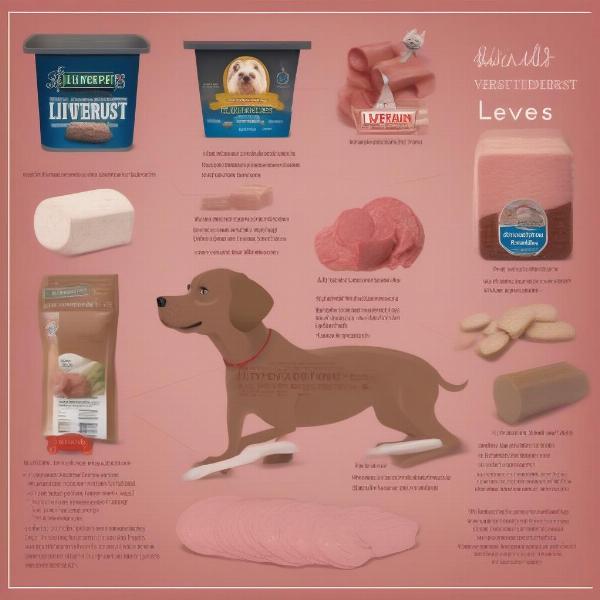Liverwurst, with its rich, savory aroma, can be tempting to share with our canine companions. But is this processed meat product truly safe and healthy for dogs? This article delves into the nutritional aspects of liverwurst, explores the potential benefits and risks, and provides practical guidelines for dog owners considering adding it to their dog’s diet.
Understanding Liverwurst and its Ingredients
Liverwurst, also known as Braunschweiger, is a type of sausage traditionally made with pork liver, along with other ingredients like pork, beef, spices, and sometimes fillers. While liver itself can be a good source of certain nutrients for dogs, the processed nature of liverwurst introduces some potential concerns.
The high fat and sodium content in liverwurst can be problematic for dogs, especially those prone to pancreatitis, obesity, or heart conditions. Additionally, some liverwurst varieties contain onions and garlic, which are toxic to dogs. Therefore, understanding the ingredients is crucial before offering liverwurst to your furry friend.
Can Dogs Eat Liverwurst Safely?
Yes, dogs can eat liverwurst, but only in moderation and with careful consideration of the specific product’s ingredients. Small amounts of plain, low-sodium liverwurst, free from onions and garlic, can be offered as an occasional treat. However, it should not replace a balanced, complete dog food.  Comparing Different Types of Liverwurst
Comparing Different Types of Liverwurst
It’s important to remember that liverwurst is a treat, not a nutritional staple. Overfeeding can lead to digestive upset, weight gain, and other health issues. Always consult with your veterinarian before introducing any new food to your dog’s diet, especially if your dog has pre-existing health conditions.
The Nutritional Value of Liverwurst for Dogs
Liver is a powerhouse of nutrients, including vitamin A, B vitamins, iron, and copper. However, these benefits can be diminished in processed liverwurst due to the addition of other ingredients and preservatives. While a small amount of liverwurst can provide a boost of these nutrients, it’s essential to ensure your dog’s primary nutrition comes from a complete and balanced diet formulated for their specific needs.
Potential Risks of Feeding Liverwurst to Dogs
The high fat and sodium content in liverwurst poses the most significant risk to dogs. Excessive fat intake can lead to pancreatitis, a serious and potentially life-threatening inflammation of the pancreas. High sodium levels can contribute to hypertension and other cardiovascular problems. is liverwurst good for dogs
Additionally, some liverwurst products contain onions and garlic, known toxins for dogs. These ingredients can damage red blood cells and lead to anemia. Always check the ingredient list carefully before offering liverwurst to your dog.
How to Feed Liverwurst to Your Dog
If you choose to give your dog liverwurst, do so sparingly. A small sliver, no larger than a thumbnail, is sufficient for small dogs. Larger dogs can have a slightly bigger piece, but moderation is key. can dogs have liverwurst
Avoid giving liverwurst regularly. Instead, offer it as an occasional, special treat. Always monitor your dog for any adverse reactions after consuming liverwurst, such as vomiting, diarrhea, or lethargy. If you notice any unusual symptoms, contact your veterinarian immediately.
Liverwurst Alternatives for Dogs
Several healthier and safer alternatives to liverwurst can provide a similar savory flavor and nutritional boost. Cooked chicken or beef liver, in small amounts, can be a good source of nutrients. Other options include dog treats specifically formulated with liver flavor, or even small pieces of cooked sweet potato or carrot for a healthier, low-fat treat.
Conclusion
Liverwurst can be a tasty treat for dogs, but it’s crucial to exercise caution and moderation. Choose low-sodium varieties free of onions and garlic, and offer it only occasionally. Prioritizing a balanced diet and consulting your veterinarian are the best ways to ensure your dog’s health and well-being. can dogs eat braunschweiger
FAQ
- Can puppies eat liverwurst? Puppies should stick to a puppy-specific diet. Liverwurst is not recommended for puppies due to its high fat and sodium content.
- What should I do if my dog eats too much liverwurst? Contact your veterinarian immediately if your dog exhibits any signs of distress after eating a large amount of liverwurst.
- Is all liverwurst bad for dogs? Not all liverwurst is inherently bad, but it’s essential to choose varieties that are low in sodium and free from harmful ingredients like onions and garlic.
- Are there any dog-specific liverwurst products? While some dog treats have liver flavor, there aren’t specific liverwurst products designed for dogs. It’s best to offer small amounts of plain, low-sodium human-grade liverwurst if you choose to give it to your dog.
- Can liverwurst cause pancreatitis in dogs? The high fat content in liverwurst can contribute to pancreatitis, especially in dogs prone to this condition.
- Is liverwurst a good source of vitamins for dogs? While liver itself contains beneficial vitamins, the processing and added ingredients in liverwurst can diminish these benefits.
- Can I give my dog liverwurst every day? No, liverwurst should only be given as an occasional treat, not as a daily part of your dog’s diet. dog treats for pancreatitis
ILM Dog is your go-to resource for expert advice on dog care and nutrition. We offer a wealth of information on dog breeds, health, training, and much more. From puppyhood to senior care, we’re dedicated to helping you provide the best possible care for your canine companion. Contact us today for personalized guidance! Email: [email protected], Phone: +44 20-3965-8624. Visit ILM Dog for more information.